Education
Australia’s Groundbreaking Ban on Social Media for Minors

Contents
Introduction to Australia’s Ban on Social Media for Minors

In an unprecedented move aimed at protecting young individuals, Australia has initiated a groundbreaking legislation that effectively bans social media access for minors. This decision reflects the growing recognition of the adverse effects that social media platforms can have on the mental health, privacy, and overall well-being of young users. The law serves as a response to mounting concerns regarding cyberbullying, the proliferation of harmful content, and the pervasive nature of online interactions that can adversely affect youth development.
One of the primary motivations behind this legislative action is the alarming increase in reported cases of mental health issues among minors, directly linked to social media exposure. Studies have shown that the constant comparison to curated online personas can lead to anxiety, depression, and low self-esteem. Additionally, the anonymity afforded by social media has created an environment where cyberbullying can thrive, further exacerbating these mental health challenges. By restricting access, Australia aims to mitigate these risks and promote healthier developmental environments for children and teenagers.
Moreover, privacy concerns have also emerged as a significant factor prompting the ban. Minors often lack the requisite understanding of the privacy implications associated with sharing personal information online. Legislative measures are being instituted to prevent the exploitation of young users’ data, ultimately safeguarding their privacy rights. The approach taken by Australia may set a precedent for other nations grappling with similar challenges, signaling a collective shift towards protective measures for young internet users.
This ban is positioned as part of a broader initiative to foster a safer digital landscape. As society increasingly acknowledges the complexities of internet usage among younger demographics, Australia’s commitment to safeguarding minors marks a pivotal moment in the ongoing discourse surrounding online safety.
Background: The Rising Concerns About Social Media Use Among Minors
The concerns surrounding social media use among minors have escalated significantly in recent years, bringing forward serious discussions regarding the impacts on mental health, safety, and well-being. Numerous studies have indicated a frightening correlation between heavy social media engagement and the rising rates of mental health issues among adolescents. For instance, the American Psychological Association has noted an increase in reported cases of anxiety and depression among teenagers attributed, in part, to their online interactions and exposure. This troubling trend has prompted experts to scrutinize how social media platforms might contribute to the deterioration of young users’ mental health.
Data collected during the past decade reveal that approximately 20% of teenagers report feeling persistently sad or hopeless, findings largely linked to their social media activities. The constant comparison with peers, often exacerbated by curated and filtered content, can lead to a distorted self-image, further contributing to anxiety and depressive symptoms. Furthermore, studies have demonstrated that young individuals who spend more than three hours daily on social media are at risk of experiencing significant mental health issues, highlighting an urgent need for protective measures.
Additionally, incidents of cyberbullying have surfaced as another critical concern associated with minors’ social media usage. Cases of online harassment can lead to severe psychological distress, and existing protective mechanisms on many platforms have proven inadequate. According to the Cyberbullying Research Center, around 36% of students have experienced cyberbullying, leading to long-lasting emotional and psychological trauma. The algorithms and design choices made by social media companies often prioritize engagement over user safety, amplifying these disturbing issues.
This troubling landscape underscores the pressing need for regulations aimed at safeguarding minors, emphasizing the necessity of a societal shift toward a safer digital environment for younger users. Enhanced oversight and structural changes in social media operations may be essential in addressing these risks and encouraging healthier online practices.
Details of the Ban: What It Entails
Australia’s recent legislation imposing a ban on social media use for minors marks a significant shift in the landscape of online safety. The ban specifically targets individuals under the age of 18, effectively prohibiting them from accessing popular social media platforms. This age restriction reflects a growing concern over the mental health and safety of younger users in a digital environment frequently associated with various risks, including cyberbullying and exposure to inappropriate content.
To enforce these age restrictions, the legislation mandates robust mechanisms for age verification. Social media companies are required to implement verification systems that may include document uploads, biometric scanning, or other forms of identification. These measures aim to ensure that minors cannot easily bypass the age requirements and that companies are held accountable for the validation of their users’ ages.
Failing to comply with the new regulations has serious implications. Penalties for platforms that permit underage access range from substantial fines to potential temporary suspension of their services in Australia. Users who attempt to falsify their age to gain access may also face consequences, including bans or legal actions, thus emphasizing the seriousness of the issue. This dual-layered approach demonstrates the government’s commitment to safeguarding minors online while holding social media firms responsible for their compliance.
The practicality of enforcing such measures has raised concerns among stakeholders. Questions arise regarding the potential for false positives in age verification processes and the extent to which companies can effectively monitor user submissions. Moreover, how these regulations will be implemented on a nationwide scale poses additional challenges. Ensuring that these mechanisms are both effective and respectful of user privacy remains a critical consideration in the successful deployment of this legislation.
Comparative Analysis: Social Media Regulations in Other Countries

As Australia implements its groundbreaking ban on social media access for minors, it is crucial to examine similar initiatives undertaken by other nations, including the United Kingdom, the United States, and various European countries. Each country has approached the regulation of social media differently, often reflecting cultural, legal, and social priorities regarding the protection of children online.
In the United Kingdom, the government has introduced measures advocating for online safety through the Online Safety Bill, which aims to hold social media platforms accountable for content exposure to minors. This legislation mandates that platforms must take necessary precautions to protect children from harmful content. Critics, however, argue that while the intent is commendable, effectiveness often comes down to how rigorously these regulations are enforced, leaving room for improvement.
In the United States, regulations are more fragmented due to the decentralized nature of governance. The Children’s Online Privacy Protection Act (COPPA) establishes certain safeguards for younger users, requiring parental consent for data collection. However, the absence of a comprehensive federal law leaves states to make individual decisions on social media access, resulting in inconsistent protections for minors. Some states are experimenting with their own laws, but no unified approach as seen in Australia has been established yet.
European countries, meanwhile, are progressing through the General Data Protection Regulation (GDPR), which offers children additional protections regarding personal data management. Some nations have gone further, exploring app regulations to limit minors’ access to social media. The varying legislative frameworks within Europe demonstrate a more cautious approach aimed at balancing child protection with the freedom of expression, reflecting diverse attitudes towards social media use.
This comparative analysis highlights the global trend toward scrutinizing social media platforms, with Australia’s ban serving as a pivotal example of a direct measure that seeks to curtail adverse effects on minors while fostering online safety and mental health. By understanding the different regulatory landscapes, Australia’s laws can be viewed within a broader context, further illuminating the challenges and opportunities that lie ahead in protecting youth in the digital age.
Public Response and Debate: Supporters vs. Critics
The announcement of Australia’s groundbreaking ban on social media for minors has sparked significant public discourse, garnering both robust support and fervent criticism. Proponents of the ban primarily include parents, educators, and mental health advocates, who argue that such legislative action is essential for safeguarding children from the myriad risks associated with social media. These supporters emphasize that exposing minors to online environments can lead to detrimental mental health effects, including anxiety, depression, and cyberbullying.
However, this approach has not been universally accepted. Critics, including freedom of expression advocates and privacy advocates, voice strong concerns over potential overreach and the implications for individual liberties. They argue that such a ban stifles free speech and limits the ability of young individuals to communicate and access information independently. Additionally, skeptics question the efficacy of the regulation, suggesting that simply banning minors from social media does not address the root causes of the challenges they face. Critics posit that education and open dialogue about responsible online behavior are more effective strategies than outright prohibition. They argue that fostering digital literacy among youth can empower them to navigate these online spaces safely and responsibly.
This complex debate underscores the contentious nature of regulatory interventions in digital spaces, reflecting broader societal concerns about child safety versus individual rights. The discussions surrounding the ban highlight a significant crossroads in which the welfare of minors on social media platforms is weighed against foundational principles of freedom of expression and digital autonomy.
Potential Impact on Social Media Platforms
The recent ban on social media usage for minors in Australia signals a significant shift in the regulatory environment surrounding online platforms. As these laws come into effect, it is expected that social media platforms will be compelled to reevaluate and revise their operational policies to ensure compliance. One of the primary areas of focus will be the implementation of stricter age verification processes. Companies may invest in advanced technology to accurately authenticate users’ ages, mitigating the risk of underage access to their services. This shift may involve more proactive monitoring and the use of biometric identification measures, further complicating the user registration process.
In response to these regulatory challenges, social media platforms might also alter their content moderation policies. By prioritizing compliance with local laws, companies may engage in more rigorous oversight of user-generated content that is accessible to minors. These internal changes could lead to increased operational costs as platforms allocate resources towards compliance monitoring and potential restructuring of existing teams dedicated to community guidelines enforcement.
Additionally, such regulatory changes might have financial ramifications for social media platforms operating in Australia. A decline in the teenage user base could result in reduced advertising revenue, as brands often target this demographic for their campaigns. Conversely, platforms could see a shift in user engagement patterns as younger audiences gravitate towards alternative communication channels or emerging social media sites that cater to their abilities and preferences.
Overall, the ban on social media usage for minors in Australia is poised to reshape the landscape for existing platforms. It will compel companies to adapt their policies, modify age verification methods, and navigate the financial implications of changing user demographics. The full scope of these adjustments will ultimately depend on ongoing discussions between regulatory bodies and social media operators in the months ahead.
Implications for Minors: Changing Online Landscapes
The recent legislative ban on social media access for minors in Australia marks a significant shift in how young individuals interact with the digital world. This groundbreaking move is poised to significantly alter the online experiences of minors who traditionally frequented social media platforms for communication and social engagement. With restricted access, there is a likely reduction in the consumption of content specific to popular platforms, prompting minors to seek alternative avenues for online interaction.
As minors transition away from mainstream social media platforms, they may increasingly gravitate towards lesser-known or emerging alternatives, which could foster unique online communities. These alternative platforms may not only enhance anonymity but also potentially create safer environments for young users. However, the shift may also lead to concerns surrounding the safety and appropriateness of new platforms that minors might turn to. The implications of such a transition are complex and multifaceted, raising questions about monitoring and maintaining online safety.
Moreover, the psychological and social implications of reduced online interaction are noteworthy. Social media has long served as a significant means for minors to cultivate friendships and express identities, providing a sense of belonging and connection. With diminished access, young individuals might experience feelings of isolation or decreased social validation. On the other hand, this scenario may encourage them to foster more in-person relationships, ultimately leading to more profound social bonds. Furthermore, the reliance on real-world interactions could promote essential skills such as effective communication and emotional intelligence, which are sometimes overshadowed in virtual spaces.
Overall, while the ban on social media for minors in Australia may present initial hurdles, it opens the door for younger generations to adapt their social lives and explore diverse communication methods. The long-term effects of this shift could contribute to more balanced interpersonal relationships and enhanced psychological well-being.
Future of Online Regulation: Looking Ahead
The recent legislation enacted in Australia, which imposes a ban on social media access for minors, has sparked considerable dialogue about the future of online regulation. As concerns regarding the safety of younger internet users rise globally, it is plausible that other nations will emulate Australia’s approach to protect children from potential harm associated with social media platforms. Various countries, particularly those grappling with similar concerns about children’s online experiences, may find this legislative model appealing for its proactive measures in safeguarding minors.
Also read: India’s Triumph: Successful Test of K-4 Nuclear-Capable Missile from INS Arighaat
Internationally, governments may face pressures to establish rigorous regulations that not only mirror the Australian ban but also address specific cultural and societal contexts. Countries with high rates of internet usage among children will likely intensify efforts to legislate around social media access, recognizing that the digital landscape is increasingly fraught with risks such as cyberbullying, exploitation, and exposure to inappropriate content. This trend may ultimately lead to a more cohesive global framework for online behavior, where guidelines and laws align more closely to enhance child safety across borders.
Looking beyond policy initiatives, the rapid advancement of technology poses its own set of challenges and opportunities for online regulation. Innovations like artificial intelligence and augmented reality can provide unique experiences for users, but they also raise complex questions regarding data privacy and the potential for misuse. As these technologies continue to evolve, regulators will need to be agile, adapting existing laws and creating new measures to address the nuances presented by these digital environments.
The Balance Between Safety and Freedom
Australia’s recent initiative to ban social media for minors marks a pivotal moment in the ongoing debate about online safety and youth engagement. This legislative action underscores the increasing recognition of the potential risks that social media platforms pose to children and teenagers. Issues such as cyberbullying, exposure to inappropriate content, and mental health challenges have prompted a reevaluation of how online environments are safeguarded for young users.
Striking a balance between safety and freedom is essential for not only defending the well-being of young people but also enabling them to explore digital landscapes that foster creativity, communication, and learning. Social media is an essential tool for connection in today’s world, and restricting access may inadvertently hinder the social development and technological literacy of minors. It is crucial that this measure, while well-intentioned, does not create an environment of overprotection that deprives young users of the opportunity to engage with diverse perspectives and experiences online.
Moreover, ongoing dialogue among legislators, educators, parents, and mental health professionals is vital to navigate the complex and ever-evolving digital landscape. As the internet continues to advance, so too should the strategies we employ to protect minors. Adaptation and critical discourse about the ethical dimensions of social media use are necessary to ensure that any protective measures remain relevant and effective in fostering a safe online experience without compromising individual freedoms. In essence, while Australia’s ban on social media for minors is a significant step towards ensuring their safety, it is imperative that we continue to engage in thoughtful conversations about how best to protect the digital rights and freedoms of young people.
Art
Orange Day Adds a Splash of Joy at DAV Centenary Public School, Jaipur
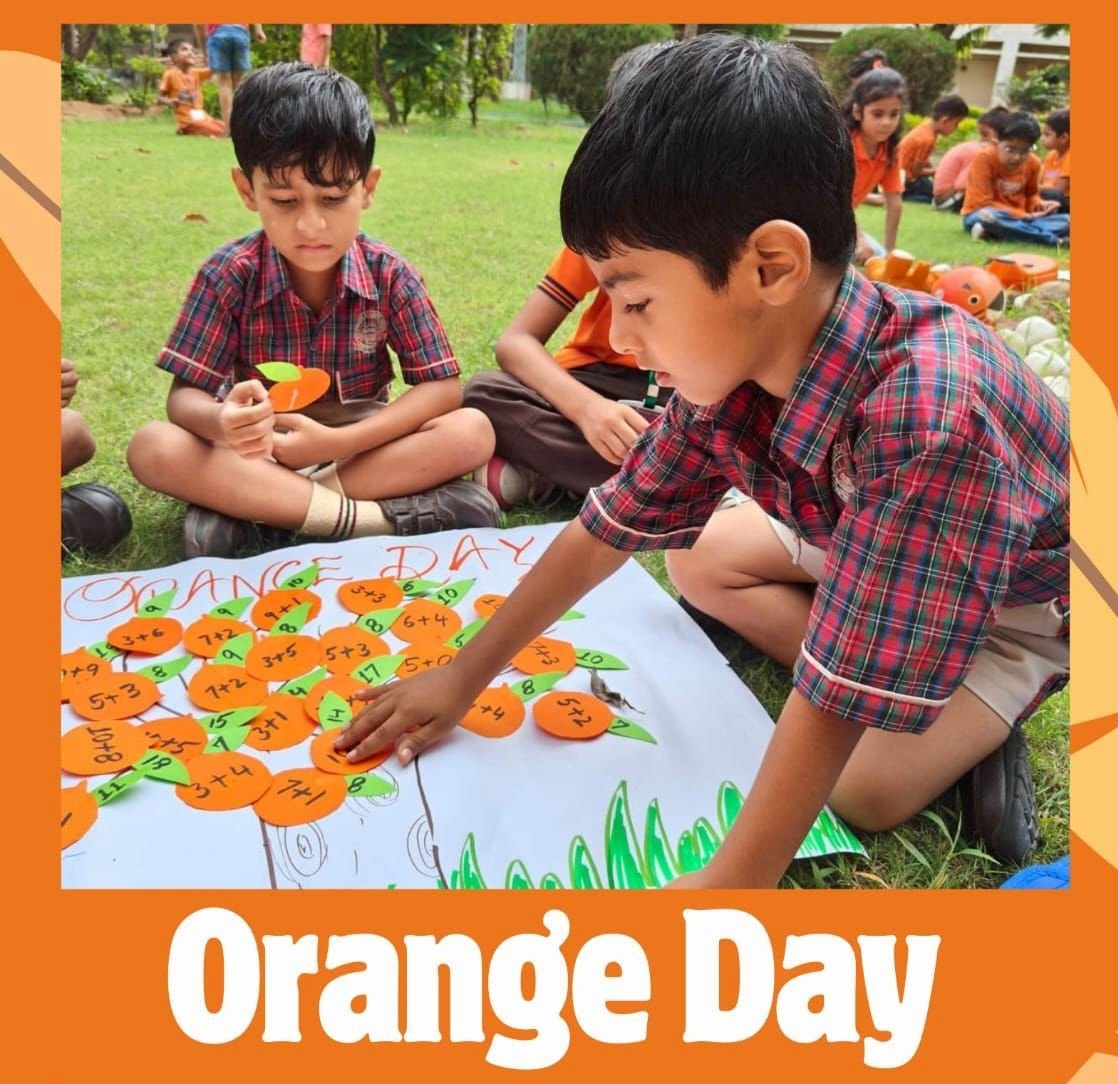
Jaipur, July 10, 2025
The tiny tots of DAV Centenary Public School, Jaipur lit up the campus as they came dressed in cheerful shades of orange to celebrate Orange Day with great excitement and enthusiasm.
The pre-primary wing turned into a lively sea of orange—from clothes and accessories to creative decorations—all reflecting the spirit of joy, creativity, and energy that the colour symbolizes. Teachers thoughtfully planned the day to help children not just enjoy, but also learn the meaning behind the colour orange—a symbol of hope, enthusiasm, and prosperity.
The classrooms were buzzing with laughter and activity as the little learners took part in various fun-filled games, storytelling, drawing, and creative expression sessions. To boost their communication skills, each child was encouraged to bring an orange-coloured object from home and speak a few lines about it in front of their classmates. For many, it was their first public speaking moment, and they did it with adorable confidence.
Principal Mr. A.K. Sharma visited the classrooms to cheer on the children. He appreciated the thoughtful planning of the teachers and said, “Activities like these help children build confidence, express themselves freely, and connect learning with real-life experiences.”
It was a delightful sight to watch the little ones bursting with curiosity, dressed in glowing orange, exploring and expressing themselves. The day left behind not just smiles and laughter, but also a colourful memory in the hearts of the young students.
Education
Guru Purnima Celebration at DAV CPS, Jaipur – A Heartfelt Tribute to Guiding Lights
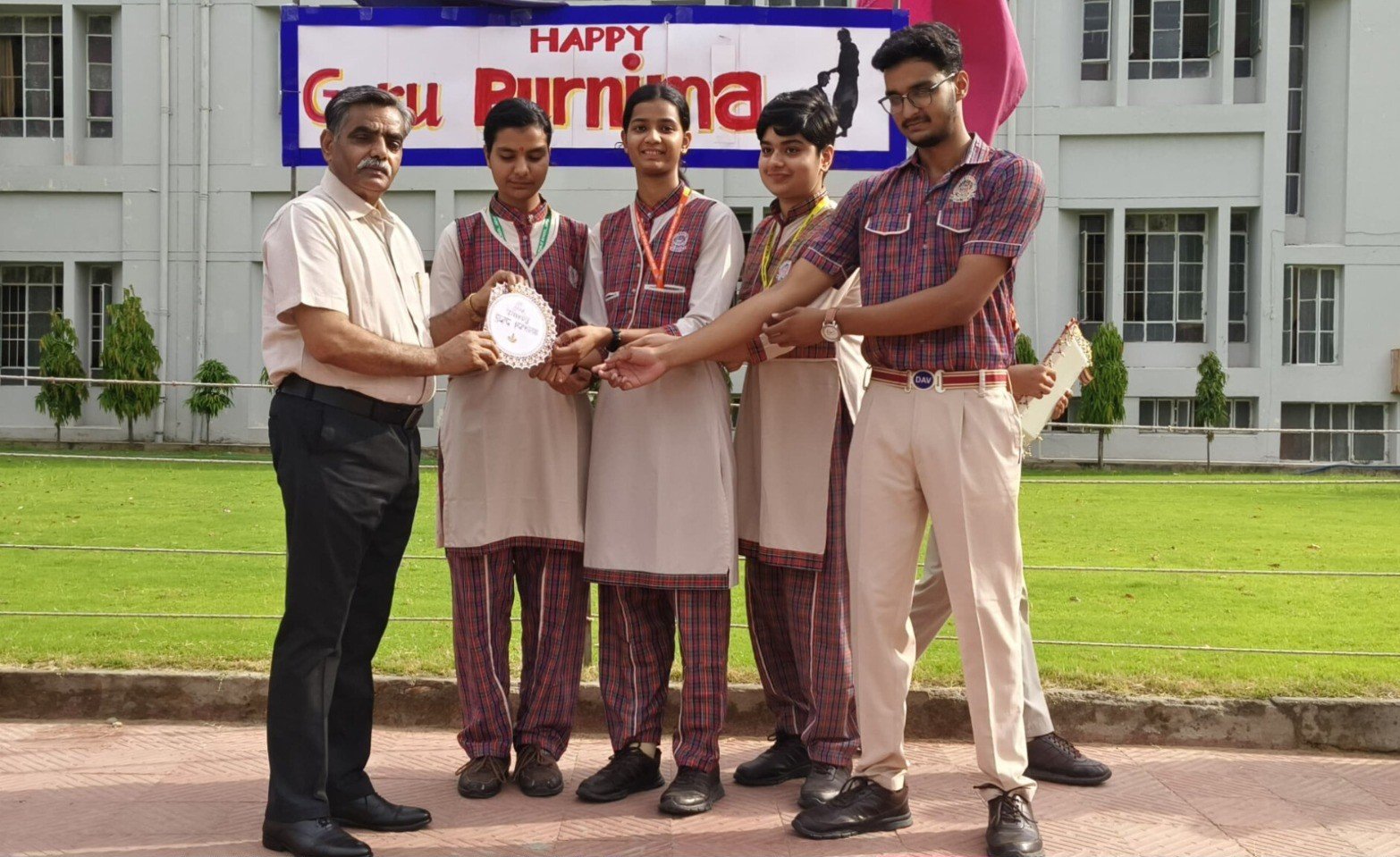
Jaipur | July 10, 2025
In an atmosphere filled with devotion, gratitude, and inspiration, DAV Centenary Public School, Vaishali Nagar, Jaipur celebrated Guru Purnima with heartfelt enthusiasm on Thursday, July 10. The event turned out to be more than just a celebration—it was a beautiful expression of love and respect for the teachers who illuminate the path of learning for their students.
The morning assembly set the tone for the day with the soothing sounds of shlokas dedicated to gurus, creating a spiritually charged environment across the campus. The essence of the celebration was beautifully captured in a speech that explained the cultural and historical roots of Guru Purnima, reminding everyone of the powerful legacy of the guru-shishya tradition.
Students poured their hearts out through soulful poems, melodious songs, and inspiring speeches, each echoing a shared sentiment—deep respect for their mentors. A mesmerizing classical dance performance, portraying devotion and reverence towards gurus, stole the spotlight and left the audience spellbound.
One of the most touching moments of the day was when the students presented a handmade gratitude card to Principal Mr. A.K. Sharma, who has been a constant source of wisdom and encouragement. In his address, Mr. Sharma reflected on the irreplaceable role of teachers in shaping young minds and urged students to stay rooted in values, discipline, and lifelong learning.
“The presence of a guru in one’s life is a blessing,” he said. “True success comes not just from knowledge, but from the humility to keep learning.”
The event concluded on a thoughtful note, leaving everyone—teachers, students, and staff—feeling more connected, more thankful, and more inspired. Guru Purnima at DAV CPS was not just an event, but an experience that reminded all of the timeless role of a teacher—not just in the classroom, but in life.
Education
Strong Start to Senior Secondary: Vardhman Srikalyan International School Holds Class 11 Orientation & PTM
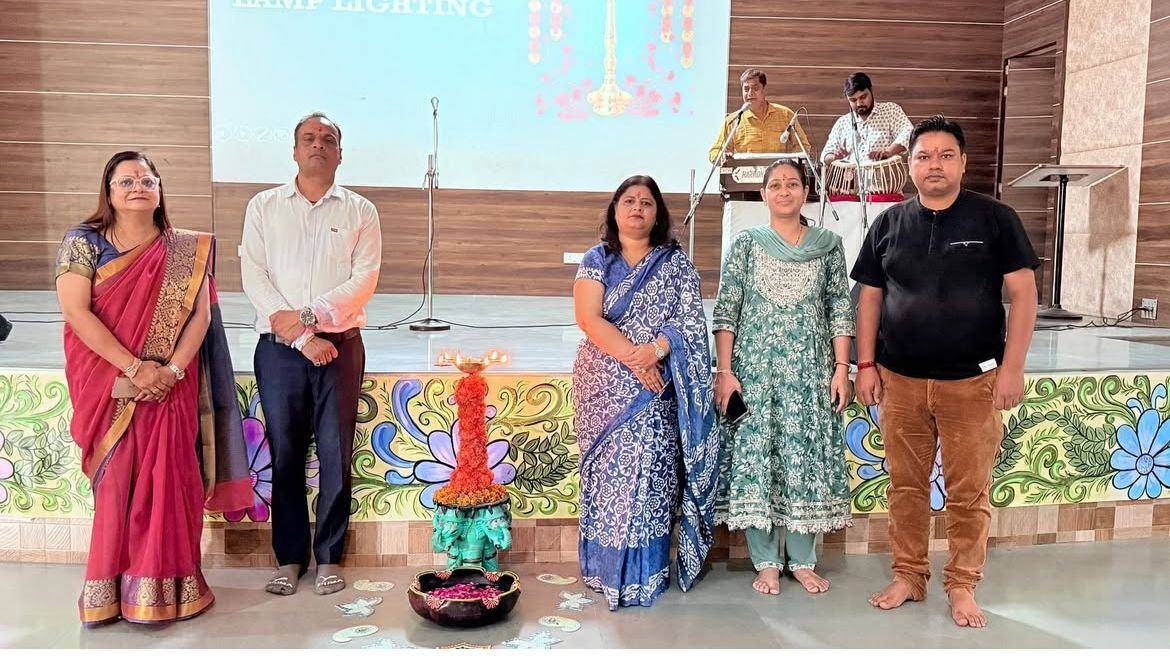
Jaipur | July 2025
Vardhman Srikalyan International School recently welcomed the parents of Class 11 students for an inspiring and well-structured Orientation Programme and Parent-Teacher Meeting, aimed at laying a strong foundation for the new academic session 2025–26.
Held under the meaningful theme “Building Bridges for a Brighter Future,” the session focused on strengthening the crucial link between school and home during this significant transition to senior secondary education.
The programme opened with a warm and motivational address by Principal Ms. Renuka Joshi, who underlined the value of shared responsibility and consistent communication between educators and parents. “When schools and parents work as one team, the student always wins,” she remarked, setting a thoughtful tone for the day.
Parents were then taken through a comprehensive presentation outlining the curriculum structure, subject choices, assessment patterns, and key expectations for the upcoming academic year. The aim was not just to inform but to empower parents with clarity and confidence as their children step into a more focused and formative stage of education.
The orientation also provided a platform for interactive discussions, allowing parents to voice queries and connect directly with the faculty members.
Overall, the event served as a powerful reminder that education is most effective when it is a collective journey, and Vardhman Srikalyan International School continues to lead that path with vision, dedication, and a heartful approach to learning.
Election
DAV Centenary Public School, Vaishali Nagar, Jaipur Event Report: Talent Hunt Show
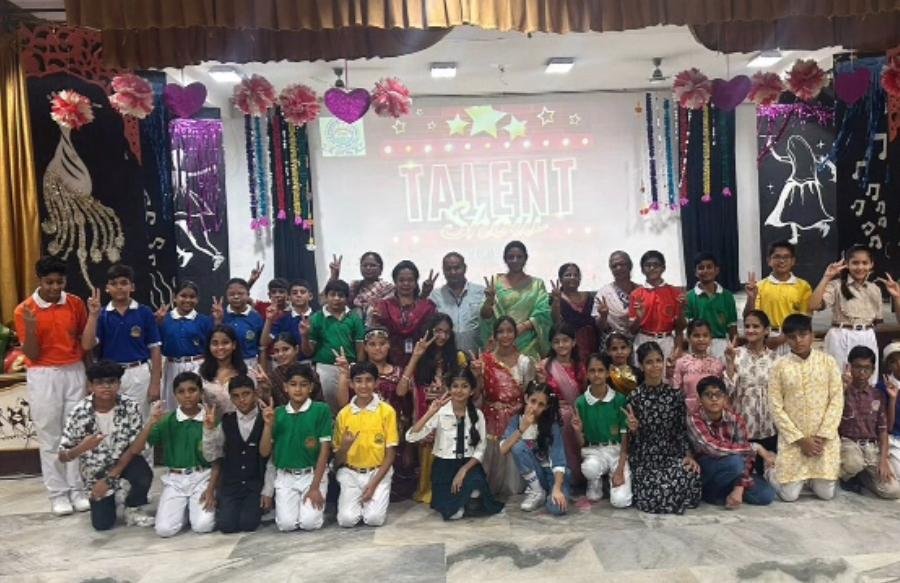
Date: 5th July 2025
Venue: School Auditorium
The School Auditorium was abuzz with excitement on 5th July 2025 as DAV Centenary Public School, Vaishali Nagar, hosted a vibrant Talent Hunt Show for the new students of Grades 6 to 8. Organized under the dynamic leadership of the School Principal, Mr. A. K. Sharma, the event served as a wonderful platform for budding artists to express themselves and build self-confidence.
A total of 35 enthusiastic students participated, showcasing a rich array of talents. Performances included classical, semi-classical, folk, and Bollywood dances; instrumental music featuring the tabla, casio, and kongo; as well as vocal renditions in Hindi, English, and even Spanish. The audience was thoroughly enthralled by the sheer diversity and creativity on display.
The event was efficiently coordinated by the class teachers of Grades 6, 7, and 8, ensuring a seamless flow of performances. The program concluded with an inspiring message encouraging students to continue nurturing their talents, followed by a warm vote of thanks from the coordinators.
The Talent Hunt Show ended on a high note, leaving the audience cheerful, inspired, and proud to be part of the DAV family.
Election
Uttar Pradesh High Court Gives Green Signal to Merger of 5,000 Schools, Dismisses Petition Filed by 51 Students
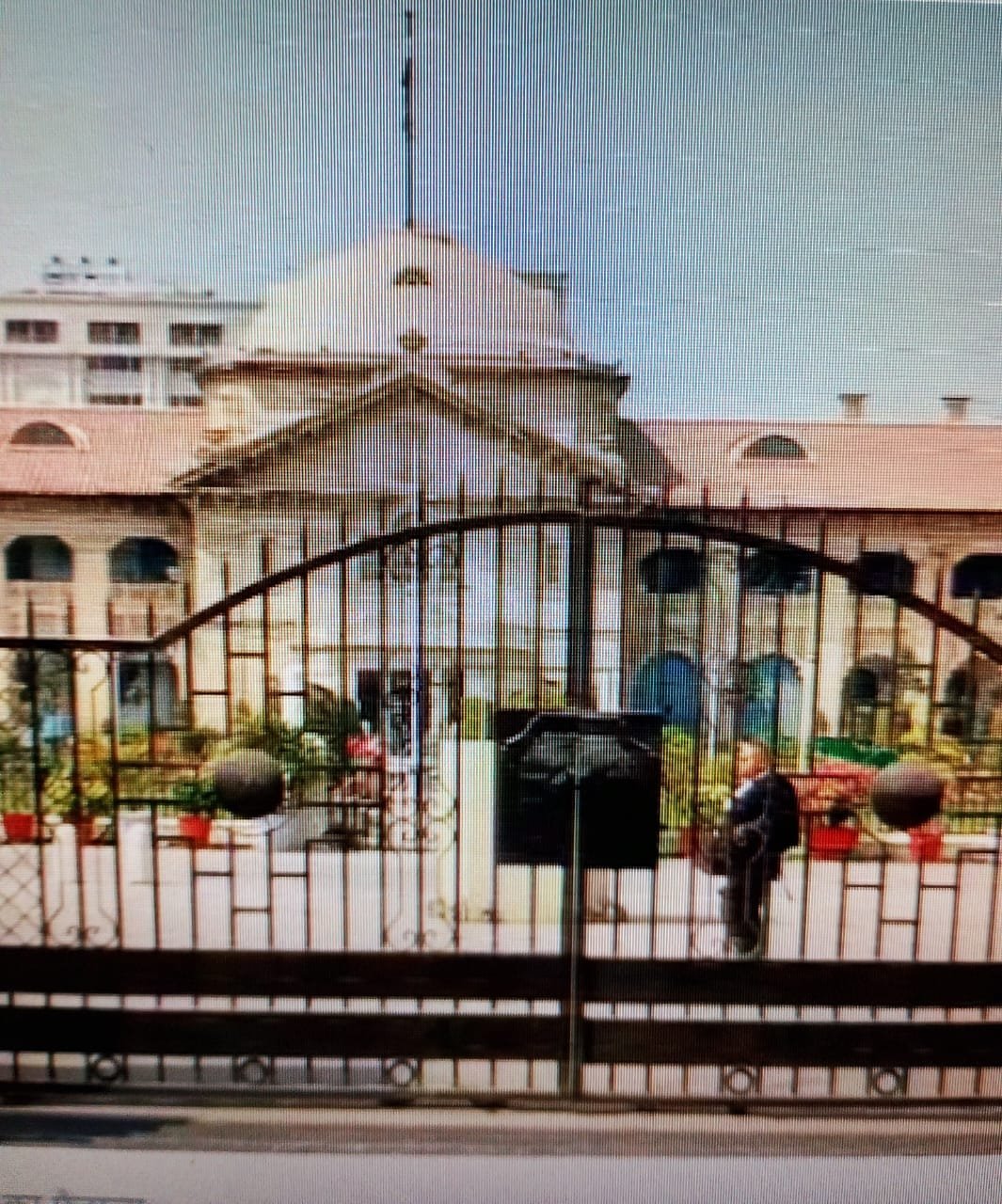
Contents
Lucknow | July 8, 2025
In a major relief to the Yogi Adityanath-led government, the Allahabad High Court’s Lucknow bench has upheld the state’s decision to merge nearly 5,000 government schools with low student enrollment. The court dismissed a petition filed by 51 students from Sitapur district who had challenged the move, calling it a violation of their Right to Education.
The High Court clarified that this is not a case of school closures, but of “pairing” — where smaller schools with fewer than 50 students are being linked to nearby better-equipped institutions to improve quality and access to education.
What the Court Said
- Not mandatory to have a school within 1 km: The bench, headed by Chief Justice Pankaj Bhatia, stated that the Constitution guarantees education under Article 21A but does not specifically mandate that a school must be located within 1 kilometer of every child’s home.
- “Pairing, not shutting down”: The court accepted the government’s argument that the policy is not about closing schools, but about optimizing resources and ensuring that students get access to better infrastructure, teaching, sports, and digital learning tools.
- Wastage of resources: The state also argued that several schools were running with extremely low enrollments and misutilization of resources — including teachers and funds.
Concerns Raised by Petitioners
- Distance and safety: Parents argued that merging schools would force young children to travel longer distances, which could increase dropout rates and pose safety risks.
- No survey or consultation: The petition also questioned why the government proceeded with such a massive change without publishing any survey, public report, or seeking inputs from stakeholders.
What Happens Now
- The High Court has cleared the way for the state to proceed with the pairing process.
- However, the door remains open for further legal action, as some education unions and political groups are reportedly considering taking the matter to the Supreme Court.
Education
Empowering Educators: A Three-Day Learning Journey at DAV Centenary Public School, Jaipur
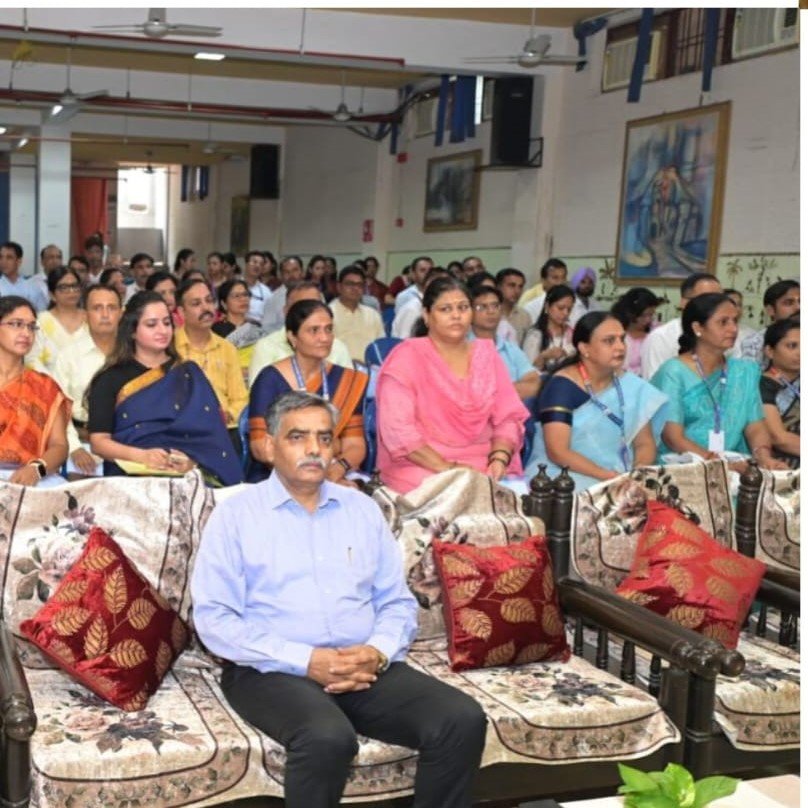
Contents
Jaipur, June 28, 2025 – Classrooms may have been quiet, but learning was louder than ever at DAV Centenary Public School, Jaipur, where teachers became students once again.
From June 26 to 28, 2025, the school hosted a powerful Offline Three-Day Capacity Building Programme (CBP) Cycle-I under the aegis of DAV Centre for Academic Excellence (DAVCAE), New Delhi. Organized jointly by Rajasthan Zone-A and Zone-C, the programme brought together 122 passionate educators from 12 DAV schools, determined to grow, connect, and reimagine their classrooms.
Training with a Purpose, Teaching with a Heart
Set across 11 different venues, the CBP wasn’t just a workshop—it was a movement. From Primary to Senior Secondary, from English to Science, and even Sanskrit to EEDP, each subject found its voice through hands-on sessions, thoughtful discussions, and expert insights shared by 31 DAVCAE-trained Master Trainers.
What made this training unique was its soul. It wasn’t about adding more chalk to the board; it was about lighting a new spark in each teacher. Topics like experiential learning, inclusive education, ICT integration, and pedagogical innovation became more than concepts—they became goals.
A Celebration of Wisdom, Music, and Togetherness
The programme began on a graceful note with the lighting of the ceremonial lamp, followed by a heartfelt welcome by Mr. A.K. Sharma, Principal of the host school and ARO of RTC Jaipur Cluster.
But this wasn’t just about academic rigor. Each evening bloomed into a musical celebration, where teachers, educationists, and even alumni came together—not just to perform, but to connect, express, and celebrate their shared purpose. These cultural evenings reminded everyone that behind every textbook is a human story.
Voices that Inspired: Messages from Leaders
Words of encouragement from Mr. Navneet Thakur (Cluster Head, RTC Rajasthan Zone-A) and Mr. Harbans Thakur (Principal, DAV HZL Sr. Sec. School, Zawar Mines) echoed throughout the event. Both leaders urged teachers to walk into classrooms not just with lesson plans, but with empathy, innovation, and collaboration.
Participants didn’t just attend—they engaged. They shared experiences, exchanged ideas, and walked away with new strategies, deeper clarity, and a renewed passion for teaching.

Gratitude, Certificates, and a Peaceful Goodbye
The programme concluded with a sincere vote of thanks by Mr. A.K. Sharma, who acknowledged every principal, teacher, and coordinator who made this event a success. Certificates of participation were awarded, not just as tokens but as symbols of commitment and growth.
As the event ended with the soulful chanting of the Shanti Mantra, there was a shared understanding: when teachers learn together, students shine brighter.
Education
St. Xavier’s School Nevta Outshines in AISSC Class 12 Results 2024-25

Contents
Principal Rev. Fr. Sangeeth Raj’s Exclusive Interview Airs on CREDENT TV
Jaipur, Rajasthan – Living up to its stellar reputation, St. Xavier’s School Nevta has once again demonstrated academic brilliance in the AISSC Class 12 Results for the session 2024-25. The school community is beaming with pride as students achieve exceptional marks across all streams, a testament to their hard work, guided mentorship, and a deeply-rooted value-based education system.
Toppers Who Made the School Proud
The spotlight shines on the stream toppers:
- Navya Sodhani (Humanities) – 97.40%
- Krish Dharewal (Commerce) – 96.40%
- Mahak Kumawat (Science) – 93.20%
These students have not only excelled academically but have become role models for the school community.
Subject Toppers Raise the Bar with 100 Marks
This year’s results also include a remarkable number of subject toppers, with over 20 students securing full marks (100) in subjects like:
- Geography
- Psychology
- History
- Political Science
- Accountancy, and more.
Outstanding scorers include:
- English (98 marks): Navya Sodhani, Avani Bansal, Yashwardhan Pareek, Nishka Sharma
- Accountancy, Psychology, Geography (100 marks): Aditya Kabra, Anushka Daditch, Kriti Yadav, Kanishka Shekhawat, Samriddhi Gupta
Their achievements reflect the school’s commitment to holistic development, academic mastery, and excellence in pedagogy.
Leadership and Vision: A Principal’s Perspective
In an inspiring interview featured on CREDENT TV, Principal Rev. Fr. Sangeeth Raj shared reflections on the school’s educational ethos and what sets St. Xavier’s apart:
“This result is not just a number but a reflection of perseverance, values, and vision. Our goal has always been to nurture responsible global citizens who strive for excellence with compassion.”
He credited the success to a collaborative ecosystem of teachers as mentors, students as learners and leaders, and parents as partners in education—guided by the principles of Jesuit philosophy.
A Collective Celebration of Excellence
The school management, teachers, students, and parents are celebrating this glorious academic milestone with heartfelt joy and gratitude. The results have not only elevated individual futures but have also reaffirmed St. Xavier’s Nevta’s legacy as a center of academic and ethical excellence.
Here’s to every achiever who proved that determination, discipline, and values are the true ingredients of success.
Congratulations to the entire Xavierian family!
Education
Teachers as Torchbearers: DAV’s Capacity Building Programme Wraps Up with Insightful Learning

Contents
A Virtual Gathering that Bridged Schools and Subjects
The DAV RTC Jaipur Cluster took a remarkable step towards educational excellence through the Capacity Building Programme (CBP) Cycle-1 for 2025–26, held virtually from May 19 to May 24, 2025. Hosted by DAV Centenary Public School, Jaipur, this six-day initiative brought together around 150 educators from six DAV schools, creating a vibrant digital space for growth, learning, and collaboration.
From Core Subjects to Co-Scholastics — A Holistic Learning Experience
With sessions scheduled daily from 9:00 am to 2:00 pm across two online venues, the programme wasn’t just limited to academics. Teachers from Primary to Senior Secondary levels explored new perspectives in English, Hindi, Sanskrit, Mathematics, Science, Social Science, EEDP, and co-scholastic areas such as Music, Dance, ICT/AI, Fine Arts, HPE, and Value Education.
In total, 20 engaging sessions were delivered by a team of 34 Master Trainers trained under DAVCAE, focusing on real-life, application-based teaching approaches, and the use of digital tools in modern education.
Inauguration with Tradition, Motivation with Vision
The event began in true DAV spirit — with a virtual lamp-lighting ceremony and Gayatri Mantra chanting. The programme was inaugurated by Mr. Ashok Kumar Sharma, Principal of DAV CPS Jaipur and ARO of RTC Jaipur Cluster. His warm welcome and active presence throughout the event infused the programme with energy, direction, and purpose.
New-Age Pedagogy, Real-Time Participation
Every session was interactive, reflective, and rooted in experiential learning. Teachers were encouraged to rethink old methods, embrace creative and critical thinking, and design competency-based lessons for today’s learners. From classroom management strategies to life skills education and inclusive practices, the programme aimed to develop well-rounded educators for evolving classrooms.
Cyber Safety Takes Center Stage
One of the most impactful moments came during the final session on Cyber Safety and Security, attended by all participants. The session highlighted the importance of digital responsibility, especially as virtual learning environments become increasingly common.
Closing with Gratitude and the Shanti Mantra
The programme concluded with an inspiring vote of thanks by Mr. A.K. Sharma, who applauded the trainers, coordinators, and participants for their dedication. He emphasized the role of empathy, innovation, and joy in transforming learning spaces and making a difference in every child’s life. The event ended on a peaceful note with the chanting of the Shanti Mantra, symbolizing unity, calm, and collective progress.
All participating teachers will receive E-certificates in recognition of their enthusiastic involvement in this transformative journey.
Credent TV
VIBGYOR Summer Camp Ends on a High at DAV Centenary Public School, Jaipur
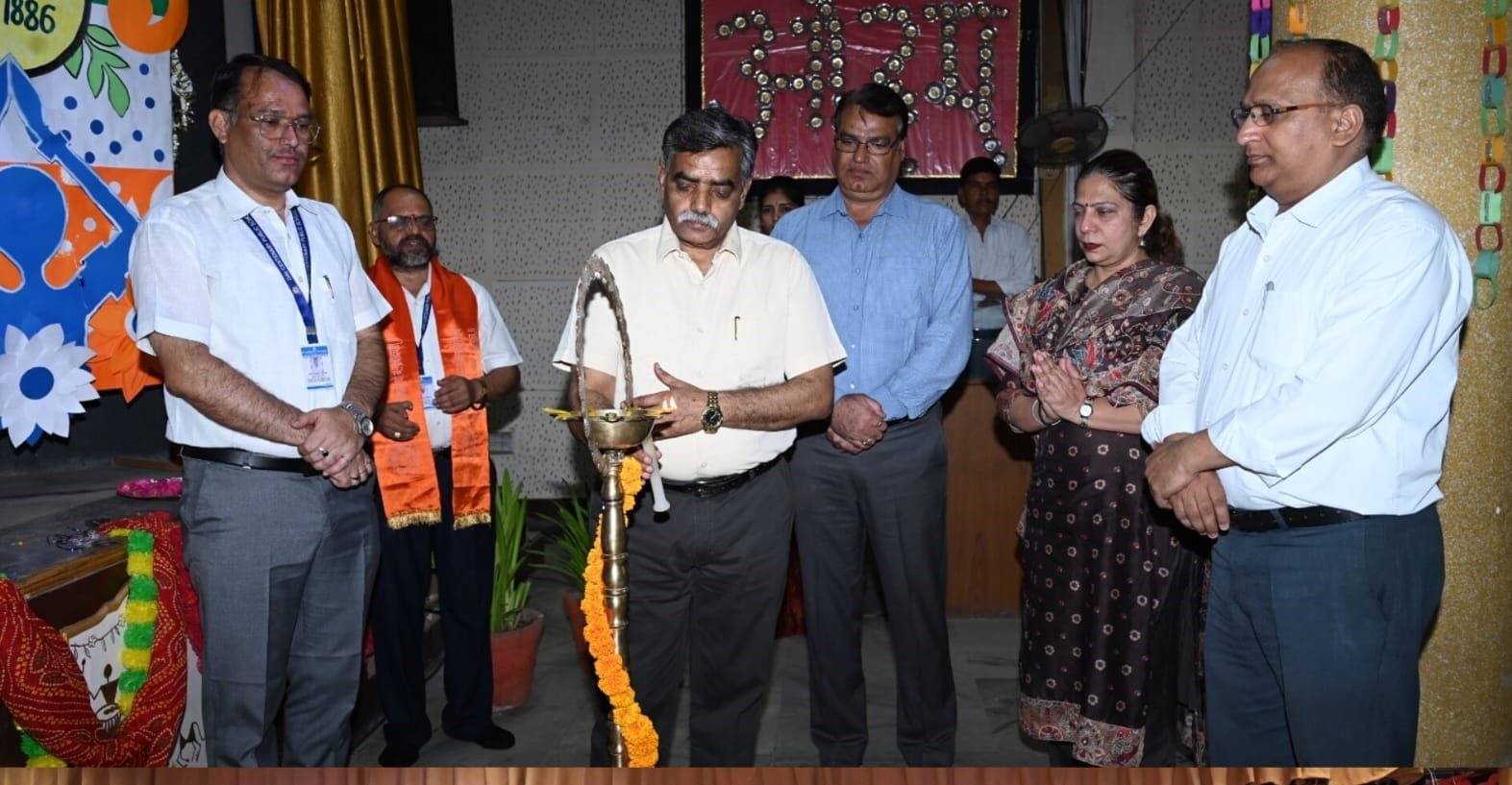
Contents
Colours of Joy, Confidence, and Creativity: VIBGYOR Summer Camp Ends on a High at DAV Centenary Public School, Jaipur
DAV Centenary Public School, Vaishali Nagar, Jaipur concluded its much-awaited 10-day summer camp ‘VIBGYOR’ with a grand Closing Ceremony on 31 May 2025. Running from 20 May to 31 May, the camp became a dynamic platform for students from DAV and nearby schools to dive into creativity, learn new skills, and experience fun-filled, meaningful activities in a safe and cheerful environment. The core motto “Learn and Share” guided each day’s schedule, promoting not just learning but also collaboration, self-expression, and overall development.
Students Shine in Cultural Show with Art, Music, Dance and Taekwondo
The Closing Ceremony began on a spiritual note with the traditional lighting of the lamp, marking the celebration of knowledge and positivity. A high-energy cultural programme followed, where students showcased their talents through colourful dance performances, melodious songs, and a well-coordinated taekwondo demonstration that reflected both discipline and confidence. Parents watched with pride as their children took centre stage, making it a memorable and emotional experience for many.
Special Guest Applauds School’s Efforts in Value-Based Learning
The school had the honour of welcoming Ms. Amardeep Chopra, Vice-Principal of Tilak Public School, Jaipur, as the Chief Guest. A passionate educator and active contributor to social causes through NGOs like Sparsh and Helpage India, Ms. Chopra commended DAV’s efforts in blending modern education with cultural and spiritual values. Her presence inspired students and staff alike, underlining the importance of social responsibility in education.
Principal Emphasises Positive Parenting and Holistic Growth
In his heartfelt address, Principal Mr. A.K. Sharma extended gratitude to the staff, students, and parents, appreciating their collective efforts that made the camp a success. He spoke about DAV’s unique identity—where tradition meets modernity, and where education is rooted in the values of Arya Samaj and spiritual practices like Havan. Addressing parents, he emphasized the importance of “connecting before correcting,” and encouraged them to reinforce good behaviour by recognizing and appreciating children’s positive actions. All participating students received certificates to acknowledge their enthusiasm and dedication. The ceremony ended on a high note, with parents applauding the school’s commitment to nurturing well-rounded individuals.
Education
7 Inspiring Highlights of DAV Foundation Day Jaipur Celebration – Amazing Vedic Legacy Revealed!
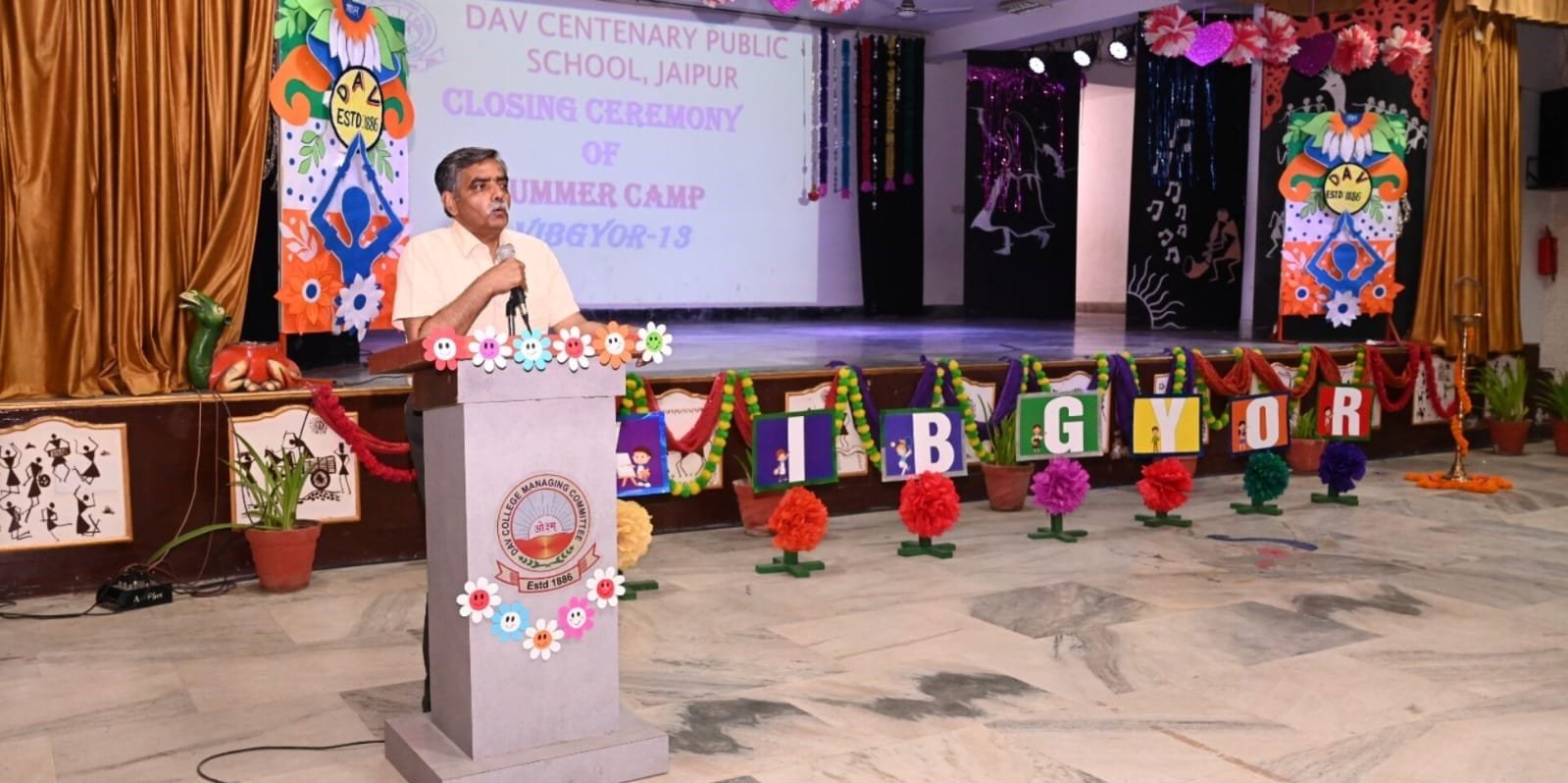
Contents
1. What is DAV Foundation Day?
DAV Foundation Day Jaipur marks the birth of the Dayanand Anglo-Vedic movement, initiated on June 1, 1886 in Lahore. It honors Swami Dayanand Saraswati’s vision of blending Vedic wisdom with modern scholarship and commemorates Mahatma Hansraj’s dedication as the first headmaster
2. DAV Foundation Day Jaipur – Opening Moments
DAV Foundation Day Jaipur began with reverence at DAV Centenary Public School, Vaishali Nagar, Jaipur. A soulful invocation reminded attendees of the school’s inception and aspirations. The reflection reaffirmed pride in the DAV mission of merging Vedic values with rigorous academics.
3. Tribute to Visionaries
A heartfelt tribute acknowledged Mahatma Hansraj’s selfless leadership and Swami Dayanand’s enduring impact. Their ideals continue guiding educators and students across India
4. Cultural Extravaganza: Music & Dance
The programme featured:
- A soul-stirring song symbolizing dedication,
- An energetic dance sequence embodying cultural pride.

Through artistic expression, students captured the spirit of DAV Foundation Day Jaipur, blending tradition with modern vibrancy.
5. Green Action: Tree Plantation Drive
In alignment with DAV’s value of environmental stewardship, students and staff led a tree plantation initiative. This initiative not only beautified the campus but fostered ecological awareness among young learners.
6. Leadership Speeches & Educational Vision
Principal Mr A. K. Sharma delivered a powerful address, praising the staff’s commitment and urging them to uphold Swami Dayanand Saraswati and Mahatma Hansraj’s values through dedicated teaching. His words illuminated the role of educators in perpetuating the DAV Foundation Day Jaipur legacy.
7. The Legacy of DAV in Jaipur & Beyond
Founded by Mahatma Hansraj in 1886, the DAV movement now spans over 900 schools and institutes across nations
Locally, DAV Centenary Public School in Vaishali Nagar upholds this heritage through disciplined academics, cultural integration, and initiatives like this year’s celebration.
The school’s reputation as one of the top educational institutions in the affluent Vaishali Nagar area reflects its excellence
DAV Foundation Day Jaipur shone with cultural celebration, green initiatives, and heartfelt tributes, reflecting a legacy of combining Vedic philosophy with modern education. As educators and students unite each year, they renew their commitment to nurturing well-rounded citizens equipped with values, environmental awareness, and cultural identity.

 Education1 month ago
Education1 month agoKota ICICI Bank Staffer Swindles ₹4.5 Crore, Gambles It All on Stock Market

 Bollywood1 month ago
Bollywood1 month agoHousefull 5 Movie Review: Akshay Kumar, Riteish Deshmukh Bring Laughter and Twists in Bollywood’s Biggest Comedy Franchise

 Education2 weeks ago
Education2 weeks ago11 Powerful Reasons Why DAV International Yoga Day Jaipur Uplifted Spirits!

 Cricket1 month ago
Cricket1 month agoBengaluru Chinnaswamy Stadium Stampede: 11 Dead, 33 Injured in RCB Victory Parade Chaos

 Education2 weeks ago
Education2 weeks ago7 Inspiring Highlights of DAV Foundation Day Jaipur Celebration – Amazing Vedic Legacy Revealed!

 Education2 weeks ago
Education2 weeks agoEmpowering Educators: A Three-Day Learning Journey at DAV Centenary Public School, Jaipur

 Credent TV2 weeks ago
Credent TV2 weeks agoVIBGYOR Summer Camp Ends on a High at DAV Centenary Public School, Jaipur

 Election4 days ago
Election4 days agoDAV Centenary Public School, Vaishali Nagar, Jaipur Event Report: Talent Hunt Show


































